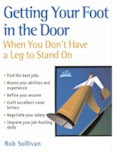"Charlie", a participant in one of my workshops posed an interesting question about how and when to divulge information that might create a less-than-stellar view of a person's background. In his case, he had a misdemeanor charge on his record that he could petition to have expunged in one year.
This brings up some interesting issues. The fact is that none of us have perfect stories. Anyone inclined to dig deep enough can probably find something in our past that would raise questions about our ability to perform in the future. In some cases, like Charlie's, the facts are easier to uncover because they are a matter of public record.
To complicate matters, Charlie made it through two rounds of interviews for a job that seemed like a perfect fit. The headhunter who presented Charlie with the opportunity had just called to say that he made it to the third and final round. At this point in the process, the company asked Charlie to fill out a form indicating any criminal convictions. Given the nature of the offense, Charlie's attorney pointed out that this particular misdemeanor was not legally considered a conviction, therefore Charlie did not have to divulge the information. However, Charlie was feeling understandably awkward and conflicted.
Having recently been eliminated from consideration by a company that specifically asked about misdemeanors (which Charlie disclosed), he did not want to jeopardize his chances again--especially given the possibility that the company might not find out. At the same time, Charlie could see that he put the headhunter in an potentially uncomfortable position by not revealing this fact in their initial conversation. After all, if the company finds out and eliminates Charlie from consideration, the hiring managers could be upset with the headhunter for not knowing or alerting them to the issue. That might, in turn, jeopardize the headhunter's relationship with the company. It would also jeopardize all of the rapport and goodwill Charlie had generated with the headhunter.
At this point in the game, Charlie has to make his own decision about how to move forward. Assuming his attorney is correct about the nature of the misdemeanor, Charlie can leave the information off the form without being considered dishonest. If the company finds out anyway and eliminates him as a candidate, there is little he can do to change their decision. All Charlie can control is his ability to maintain presence as he tells his story.
That may not seem like much, but it is.
Presence is everything. If the company confronts Charlie and he appears uncomfortable and hesitant, the company may wonder what else he is hiding. On the other hand, if he maintains his composure, acknowledges the facts, and emphasizes what he learned about himself in the process, he may leave the company with a completely different impression. The company may or may not reconsider, but at least he will have given himself a shot and, most importantly, maintained integrity.
Having worked myself as a retained headhunter, I know just how important it is to have the full story from candidates. No one likes unpleasant surprises. Some headhunters may hear the facts and decide not to work with Charlie. Others may not be concerned. Here again, Charlie cannot predict or control the reactions. He can only present the facts and give people space to make their own decisions. In the interest of building successful long-term relationships, being honest and upfront is always the best way to go.
Wednesday, August 8, 2007
Subscribe to:
Posts (Atom)

.jpg)